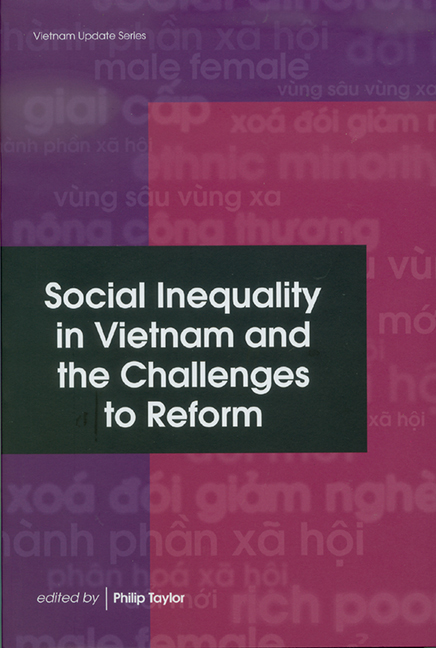Book contents
- Frontmatter
- Contents
- List of Tables
- List of Figures
- Preface
- Introduction: Social Inequality in a Socialist State
- 1 Vietnam's Recent Political Developments
- 2 Vietnam's Recent Economic Reforms and Developments: Achievements, Paradoxes, and Challenges
- 3 Behind the Numbers: Social Mobility, Regional Disparities, and New Trajectories of Development in Rural Vietnam
- 4 From Collectivization to Globalization: Social Differentiation in a Muong Ethnic Community of Vietnam
- 5 Political Capital, Human Capital, and Inter-generational Occupational Mobility in Northern Vietnam
- 6 Social Disparities in Vietnam: The Case of Poverty Reduction and Educational Attainment
- 7 Redressing Disadvantage or Re-arranging Inequality? Development Interventions and Local Responses in the Mekong Delta
- 8 The Politics of Land: Inequality in Land Access and Local Conflicts in the Red River Delta since Decollectivization
- 9 Female Garment Workers: The New Young Volunteers in Vietnam's Modernization
- 10 Class, Nation, and Text: The Representation of Peasants in Vietnamese Literature
- 11 Leisure and Social Mobility in Ho Chi Minh City
- Index
- About the Contributors
- Publications in the Vietnam Update Series
1 - Vietnam's Recent Political Developments
Published online by Cambridge University Press: 21 October 2015
- Frontmatter
- Contents
- List of Tables
- List of Figures
- Preface
- Introduction: Social Inequality in a Socialist State
- 1 Vietnam's Recent Political Developments
- 2 Vietnam's Recent Economic Reforms and Developments: Achievements, Paradoxes, and Challenges
- 3 Behind the Numbers: Social Mobility, Regional Disparities, and New Trajectories of Development in Rural Vietnam
- 4 From Collectivization to Globalization: Social Differentiation in a Muong Ethnic Community of Vietnam
- 5 Political Capital, Human Capital, and Inter-generational Occupational Mobility in Northern Vietnam
- 6 Social Disparities in Vietnam: The Case of Poverty Reduction and Educational Attainment
- 7 Redressing Disadvantage or Re-arranging Inequality? Development Interventions and Local Responses in the Mekong Delta
- 8 The Politics of Land: Inequality in Land Access and Local Conflicts in the Red River Delta since Decollectivization
- 9 Female Garment Workers: The New Young Volunteers in Vietnam's Modernization
- 10 Class, Nation, and Text: The Representation of Peasants in Vietnamese Literature
- 11 Leisure and Social Mobility in Ho Chi Minh City
- Index
- About the Contributors
- Publications in the Vietnam Update Series
Summary
In the early years of the twenty-first century, political forces in Vietnam continued to maintain the same power balance founded since the 1986 6th Party National Congress of the Vietnamese Communist Party (VCP). This balance is manifested in leadership succession at the top echelons of the VCP, and in the fact that succession is now decided more or less on autopilot according to a formula that has been laid down. This balance is the source of the current political stability. There has also been a generational change in leadership that impacts on policy. It is difficult to imagine present policies being put in place by past leaders of the early and mid-1980s; it is also difficult to imagine the country bearing the fruits of its economic growth and development strategies without the political balance — and stability — achieved within the VCP. At one point in the late 1980s, it appeared that other elites in the VCP might emerge and triumph in a divisive atmosphere in the uncertainty thrown up by the collapse of the Soviet Union, the motherland of socialism. The party has overcome that divisive period, and it is now the sole political force in the country, through which various political forces of the country have over the years learned to exercise influence, to lobby, and to carry out their political objectives.
This chapter argues that the present political balance is likely to remain for years to come, with two conditions. First, the good economic times are maintained. Second, the unresolved contradictions in the economic and social environment do not create overly intense pressure for changes in the political arena. On the other hand, however, there are other developments that alter the nature of the regime and which are happening incrementally, although they do not promote regime change in the sense of the VCP giving up political power to another political party.
- Type
- Chapter
- Information
- Publisher: ISEAS–Yusof Ishak InstitutePrint publication year: 2004

